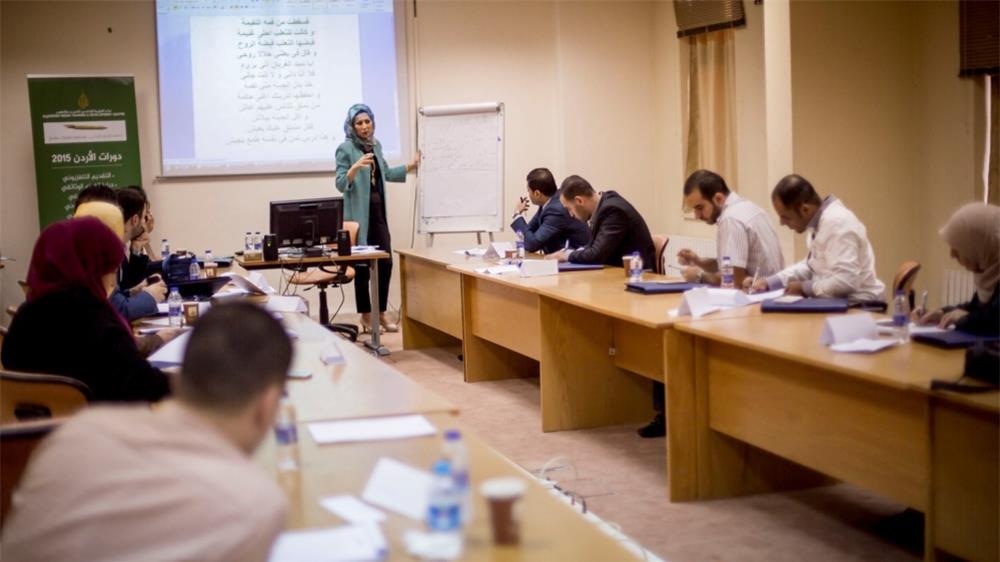تخضع العلوم الصحفية لرؤية ومهارات المعد أو المنتج في تكوين المادة أو الرسالة، ولذا فإن الصحافة والإعلام هما من أكثر التخصصات الجامعية صعوبة فيما يتعلق بتحديد مراجعها ومصنفاتها العلمية. وهي لا تستند كغيرها من العلوم إلى قوانين ثابثة ومعايير مسلَّم بها. وهنا تبرز أهمية الخلفية أو الإطار المرجعي لكل من يعمل في هذا المجال سواء أكان مبتدئا أم محترفا.
تعاني المؤسسات الإعلامية اليوم من فرط الجدل حول أهمية أن يكون العامل في الإعلام من الدارسين لهذا التخصص أم لا.
وهنا يجدر العودة إلى ما يتعلمه الطلبة في أقسام وكليات الإعلام في مختلف الجامعات العربية وما يطبق في المؤسسات الإعلامية.
لقد عكفت الجامعات في إعداد خططها الدراسية لطلبة الإعلام في تخصصات الإذاعة والتلفزيون والصحافة والعلاقات العامة، إلى الجوانب النظرية والأساسيات من المهارات الصحفية.. فهل تلبي هذه الخطط وما تحتويه متطلبات سوق العمل؟ وهل تعمل على إعداد مخرجات قادرة على التعامل مع واقع وطبيعة هذا السوق؟
لكليات الإعلام الأردنية أهمية في حقل التكوين الصحفي، بيد أنها هي الأخرى تعاني مما تعانيه نظيراتها في العالم العربي من بعد ما بين النظري والتطبيقي. وللتقرب أكثر من بانوراما التعليم والتطبيق فيها فقد سألنا بعض خرّيجيها عن مدى مواكبة المناهج المدرّسة للسوق ومدى الاستفادة من العلوم التي تلقوها على مدار أربع سنوات في الجامعات؟
اليرموك.. الدوران والعودة لنفس النقطة
في كلية الإعلام بجامعة اليرموك الأردنية، يوجد أربعة وعشرون مدرسا لمختلف التخصصات، هم في غالبيتهم من الأكاديميين وبعض من عملوا في حقل الإعلام منذ سنين طويلة تطور فيها مفهوم الرسالة الإعلامية وتطورت معها الوسائل والأدوات في سوق العمل.
يجد عبد الجبار حسين، خريج صحافة من جامعة اليرموك، أن تطوير الأستديوهات والتقنيات في جامعته وفّر له فرصة للتدرب على معدات حديثة وأن محاولات الجامعة في جلب بعض العاملين في حقل الإعلام لإعطاء محاضرات للطلبة أكسبته قدرا جيدا من ملامسة الواقع، إلا أنها ليست كافية في تبيان الصورة الحقيقة.. فمحاضرة أو اثنتان لسن كفيلات في تهيأة الطلبة للواقع الذي ينتظرهم. لكن إتاحة الفرصة للطلبة للتدرّب في المؤسسات الإعلامية خلال فترة الدراسة، من شأنه أن يخلق توازنا بين النظرية والتطبيق.
يتطلب العمل الأكاديمي من المدرسين إعداد رسائل بحثية بشكل دوري، وهو ما يعكف عليه الأساتذة والمدرسون، لكن فائدة هذه البحوث تقتصر على معد البحث ولا تُنقَل إلى الطلبة.
وهنا يبرز تساؤل يطرحه أكاديمي انضم حديثا إلى طواقم التدريس في جامعة اليرموك بقسم الصحافة والإعلام حول ضرورة تفريغ مدرسي الإعلام في فترات متفاوتة للعمل في المؤسسات الإعلامية ليكتسبوا مزيدا من الخبرات التطبيقة والعملية التي يمكن أن تكون مصدرا مهما في سلك التعليم ونقل تجارب واقعية لطلبتهم تضعهم على بداية الطريق للانخراط في سوق العمل وتذلل الكثير من الصعاب التي قد يواجهونها مستقبلا.
التجديد في كلية الإعلام بجامعة اليرموك كان في الكادر الذي ضمت إليه الجامعةُ خرّيجيها دون أن تتفطّن لمسألة نقص الممارسة، الأمر يعيد الجدل إلى الدائرة الأولى وهي عدم ممارسة المدرّس للمهنة.
الزرقاء الأهلية.. تحديثات شكلية
كلية الإعلام في جامعة الزرقاء الأهلية الأردنية لا تزال تدرِّسه (الإعلام) دون فرز للتخصصات، بحيث يدرس الطالب المواد مجتمعة فينهل من كل تخصص الشيء اليسير لكنه لا يستطيع تكوين فكرة واضحة عن أي من فروع الإعلام ساعة تخرجه. كما أن عشرة من المدرسين يعكفون على تعليم الطلبة هم بجلهم من الأكاديميين الذين لم يمارسوا العمل الصحفي بشكل دائم، ما يعني عجرا واضحا في مواكبة ثورة الإعلام لاسيما في عالم التواصل الاجتماعي المفتوح.
يقول فراس صلاحات، وهو صحفي تخرج منذ عام ونصف، إنه بإمكان الجامعات توفير تدريبات من خلال اتفاقيات تبرمها مع المؤسسات الإعلامية، إذ تنحصر تجارب المدرسين على العمل في الصحافة المكتوبة التي يتقلص فيها هامش الحرية في ظل بروز العمل الإعلامي الإلكتروني والسرعة في تداول الأخبار ونقلها وارتفاع هامش الحرية في مواقع التواصل الاجتماعي.
وتظل القوانين والتشريعات وأخلاقيات العمل المهني واحدة من الثوابت التي يمكن أن يرتكز عليها العامل في الإعلام مهما تغيرت الظروف والتقنيات وهي برأي صلاحات، تصلح لكل زمان ومكان .
أما عن قدرة كليات الإعلام على تهيأة الخريجين لسوق العمل فيرى علاء عواد، المدرس السابق في جامعة الزرقاء الأهلية الأردنية أن المناهج الأكاديميه لا تخلق صحفيين لأن الصحافه ملكة كالشعر والموسيقى ولكن الدراسه الأكاديميه يمكن أن تهيء طلبة الإعلام النابهين والجادين في التعلم للانخراط بسوق العمل والتدرج صعودا حسب قدرة كل خريج..."
أما أمجد عمر صفوري، عضو هيئة تدريس في كلية الصحافة والإعلام بذات الجامعة، فيقول "إن المناهج الأكاديمية في كليات الإعلام وأقسامه في الممكلة تشهد تحديثات مستمرة حتى تواكب التطورات في مجال الإعلام بمختلف فروعه، إلا أن هذه التحديثات قد تكون شكلية لا تلامس المضمون الحقيقي الذي يحتاجه الطالب الذي يشهد تطور الإعلام ويلمسه في حياته العادية، بينما بعض الخطط الدراسية بعيدة بعض الشيء عن مجاراة هذا التطور، لاعتمادها بالدرجة الأولى على المضمون التقليدي في التدريس وليس على التدريب العملي المصاحب للتدريس".
المعهد الأردني للإعلام.. المفاتيح في الأيادي
وعلى عكس التجارب السابقة في محدودية المقدار العملي في الخطط الدراسية جاءت تجربة معهد الإعلام الأردني الذي بدأ تدريس الماجستير بالإعلام في الأردن بالتعاون مع الجامعة الأردنية.
اعتمد المعهد على برامج عملية في تطوير أداء الطلبة واستند إلى مناهج تطوِّر مهارات البحث والكتابة الصحفية وإرساء المعايير الأخلاقية للصحافة لدى الطلبة.
عن تجربته في المعهد يقول معتز نعواش، أحد خريجي المعهد عام 2015 "إن التدريس في معهد الإعلام الأردني يركز في جزء كبير منه على التعليم العملي أكثر من النظري الأكاديمي، والتركيز أكثر على أدوات الإعلام الرقمي بوجود مادتين أساسيتين لهذا الغرض تحتوي على الأدوات الأساسية للتصوير والمونتاج ووضع المحتوى على الإنترنت.. مناهج المعهد بشكل عام تعطي كل مفاتيح العمل الإعلامي إن كان مكتوبا أو إذاعيا، وهي لا تصنع إعلاميا إنما تصنع مشروع إعلامي يمتلك مفاتيح الأدوات الإعلامية كاملة وعليه تطويرها للعمل في سوق الإعلام".

أما عبير الكالوتي، إحدى خرّيجات الدفعة الأولى من المعهد عام 2011، فقالت إن المناهج اعتمدت على الجانب التطبيقي مباشرة دون الالتفات إلى التعريفات والنظريات، وهو ما يحتاجه الطالب في مرحلة ما بعد البكالوريس حيث وضعتهم المواد في المعهد على الطريق العملي منذ اليوم الأول.. رغم أن الأمر يبدو كسيف ذي حدين، فهو من جهة يضع الطلبة من خريجي التخصصات الأخرى أمام عالم مجهول، ومن جهة أخرى يستطيع دارسو الصحافة مواكبة المناهج بسهولة.
استقطب المعهد شخصيات إعلامية مرموقة على مستوى العالم من مناطق مختلفة وبشكل دوري لينقلوا خبراتهم للطلبة بين الحين والآخر وهو ما ساهم في إثراء تجربة الدارسين.
تضيف الكالوتي أن الجانب النظري ركز على مفصليات العمل المهني وما قد يواجه الصحفي في الميدان خاصة تلك الأمور المتعلقة بالجانب التشريعي والأخلاقي لمهنة الصحافة.
استخدمت المناهج النظرية في المعهد أسلوبا محاكيا للواقع بحيث وضعت الطالب في العوامل التي تحيط بإنتاج المادة الصحفية ليلمس الطالب تجربة تشبه إلى حد كبير التجربة في سوق العمل.
وتدلل عبير على تلك المحاكاة بعامل الوقت، حيث كانت تطلب من الطلبة مواد صحفية في إطار زمني محدد ويجب الالتزام بهذا الإطار، بالإضافة إلى مراعاة خط التحرير في المؤسسة الصحفية ومحاولة الطالب أن ينهي المطلوب منه في ظل هذه العوامل لينال الدرجة وفقا لالتزامه بتحقيق الشروط والإيفاء بمتطلبات المنتج الصحفي".








































